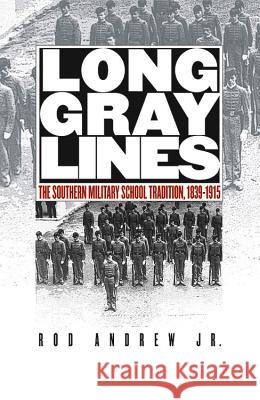Long Gray Lines: The Southern Military School Tradition, 1839-1915 » książka
Long Gray Lines: The Southern Military School Tradition, 1839-1915
ISBN-13: 9780807855416 / Angielski / Miękka / 2004 / 169 str.
Military training was a prominent feature of higher education across the nineteenth-century South. Virginia Military Institute and the Citadel, as well as land-grant schools such as Texas A&M, Auburn, and Clemson, organized themselves on a military basis, requiring their male students to wear uniforms, join a corps of cadets, and subject themselves to constant military discipline. Several southern black colleges also adopted a military approach.
Challenging assumptions about a distinctive "southern military tradition," Rod Andrew demonstrates that southern military schools were less concerned with preparing young men for actual combat than with instilling in their students broader values of honor, patriotism, civic duty, and virtue. Southerners had a remarkable tendency to reconcile militarism with republicanism, Andrew says, and following the Civil War, the Lost Cause legend further strengthened the link in southerners' minds between military and civic virtue.
Though traditionally black colleges faced struggles that white schools did not, notes Andrew, they were motivated by the same conviction that powered white military schools--the belief that a good soldier was by definition a good citizen.
" Long Gray Lines] is a valuable resource. It is well researched, well argued and thought provoking. . . . A useful work with important insights into a significant southern tradition.--Civil War Book Review
"An important work that engages larger historical questions.--Journal of Military History
"This provocative, highly original, and thoughtfully illustrated study is grounded in impressive research. . . . It invites us to rethink the southern military tradition.--Journal of Southern History
Challenging assumptions about a distinctive "southern military tradition," Rod Andrew demonstrates that southern military schools were less concerned with preparing young men for actual combat than with instilling in their students broader values of honor, patriotism, civic duty, and virtue. Southerners had a remarkable tendency to reconcile militarism with republicanism, Andrew says, and following the Civil War, the Lost Cause legend further strengthened the link in southerners' minds between military and civic virtue.











